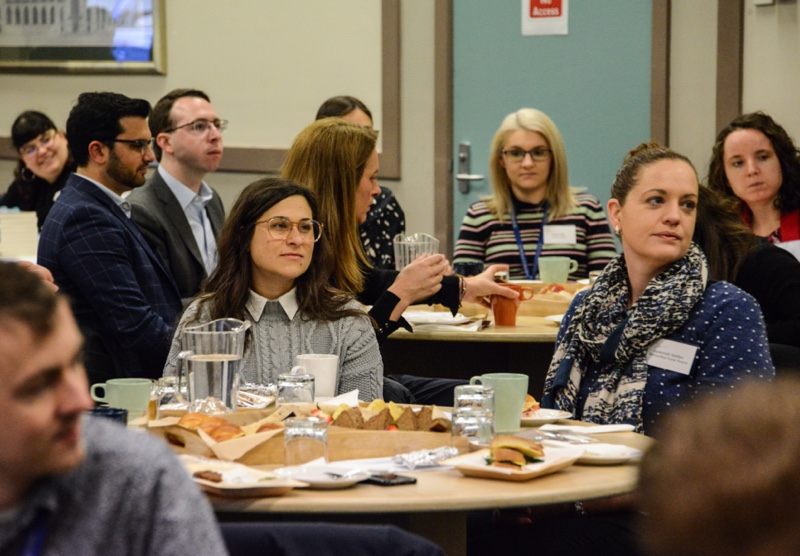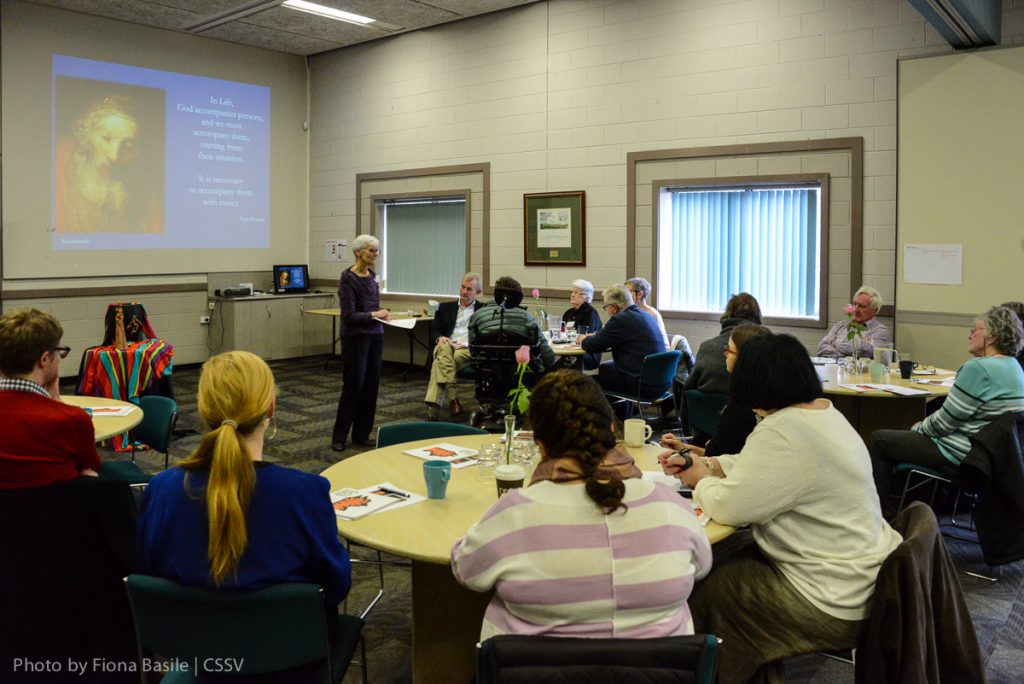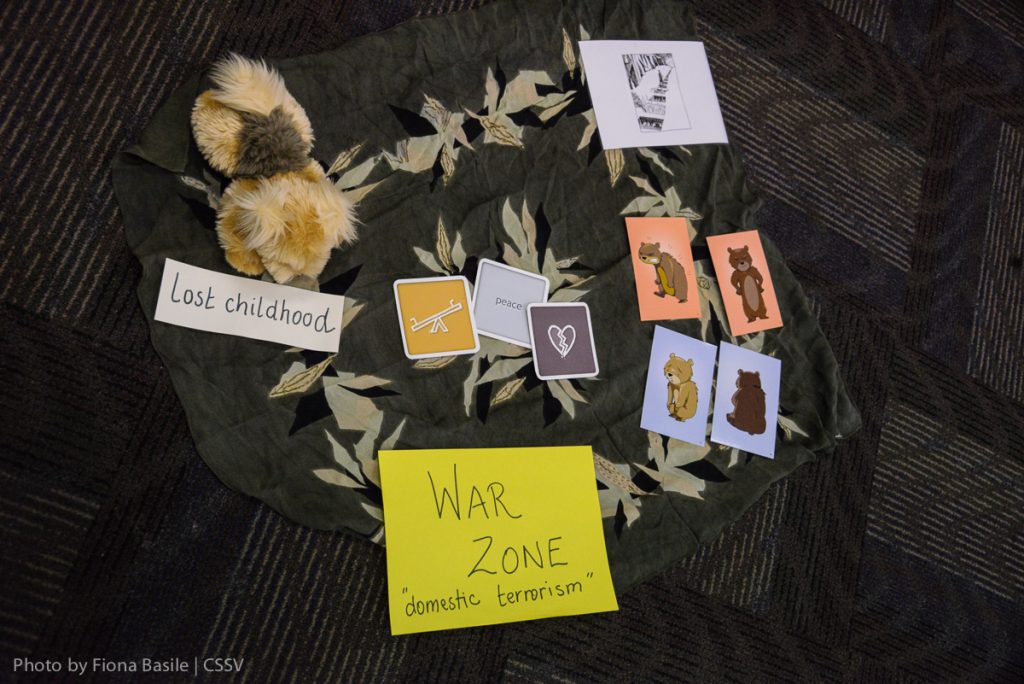“Families are a vital part of parish life. We want to promote strong and flourishing families and relationships,” says Mercy sister Nicole Rotaru. “Knowing this, we can no longer ignore the critical issue of domestic violence within our local communities, and the Gospel mandate that calls us to do something about this.”
For the past 12 months, Sr Nicole has been offering information and training workshops to parish communities and Catholic organisations in Melbourne and surrounding areas. She is part of the Domestic Violence Working Group auspiced by Catholic Social Services Victoria, which includes representatives from member organisations that assist women and children impacted by violence (including McAuley Community Services for Women, Good Samaritan Inn, Good Shepherd Australia New Zealand).
Nicole says the Victorian Royal Commission into Family Violence encourages faith communities to be proactive about educating their people around domestic violence. Recommendation 165 of the Royal Commission into Family Violence, states: Faith leaders and communities establish processes for examining the ways in which they currently respond to family violence in their communities and whether any of their practices operate as deterrents to the prevention or reporting of, or recovery from, family violence or are used by perpetrators to excuse or condone abusive behaviour.
“This is a clear directive that faith communities have a significant role to play in helping to prevent domestic violence,” says Sr Nicole. “When we understand domestic violence, what it is, what it looks like, and how we can respond, parish and faith communities are better able to implement preventative measures. ”A number of Catholic parishes have taken up Nicole’s invitation to spend time with the parish community delving into the topic: ‘Domestic Violence: What is it? What supports are available?’
The workshop provides an understanding of what domestic violence is, the various ways in which it is perpetrated and a closer examination of the impact that domestic violence has on women and children.
“We come to a deeper understanding of what power and control means and the ways in which the perpetrator uses power and control to incite fear in another person,” says Nicole. “We look at the findings and learnings from the Royal Commission into Family Violence and we conclude with the practical things that we can do – the supports that are available.” RESPECT 24/7 1800 737 732, Safe Steps 24/7 1800 015 188, in case of immediate danger call ‘000’.
“It’s not a case of parishioners needing to know all of the answers or needing to act on behalf of women. That’s not their job. It takes away the independence of the woman,” says Nicole. “Rather, it’s for us to be aware of and to know where are the places that we can get professional guidance and help for someone affected by domestic violence. This is an emphasis in the workshop.”
Sr Nicole says the workshop participants walk away with a greater understanding of what domestic violence is, a greater capacity to know where to get help, a deeper understanding of the impact of violence on women and children. A number of participants have requested information about the impacts on men who have experienced domestic violence. “People are often shocked by the impact that domestic violence has on women and children and they see this clearly in the case studies I share with them,” she says. “People are also shocked by the statistics. They just don’t realize how wide spread this is.”
Graham Ashton, the Commissioner for Victorian police has said that the police respond to 600 plus calls a day related to domestic violence. Our Watch lists the following statistics: One woman a week is murdered. One in three women have experienced violence from their partner. One in four women have experienced violence from another person. 95% of perpetrators are male. 5 % are female. One in four children witness violence against their mother or step-mother. The impact on the economy is 22 billion a year.
Domestic Violence refers to ‘acts of violence that occur in domestic settings between two people who are or were in an intimate relationship. It includes physical, sexual, emotional, psychological and financial abuse.’
See www.ourwatch.org.au.See also the Victorian parish tool kit, which contains facts and figures, and resources.
“We know parishes are often busy and under-resourced, but as we can see from the statistics, domestic violence is a critical issue in our society,” says Nicole. “As we come to grips with these statistics we come to see the likelihood that one in three women in our church has probably experienced violence. When we think of the children in our classrooms, we have to think that some of these children have come from an environment where they feel unsafe and walk on egg shells. There are people in our communities directly impacted by domestic violence.”
We value family life and want to nurture it and enable it to thrive. By educating ourselves on domestic violence we can be more aware and alert and know where to direct someone to seek professional help if requested,” says Sr Nicole.
“When we think of people living in dread and fear, we have to ask ourselves as a faith-based community, what do the Gospels teach us? How did Jesus treat people and promote respectful relationships?
Our Lady of Perpetual Help in Dandenong was the most recent parish to host this workshop. Fourteen parishioners gathered on 30 June with feedback including: “We need to continue more work on this issue”, “More men and women need to come to the workshop”, “The statistics were a huge surprise”, “Thank you so much for deepening my knowledge on domestic violence; there was so much I wasn’t aware of”.
How can Parishes organise a workshop?
1. Parish priests, parish secretaries, pastoral associates, key leaders in the parish community are invited to email Denis Fitzgerald, Executive Director of Catholic Social Services or phone him on (03) 9287 5569 or 0418 136 372 indicating their desire to have Sr Nicole visit their parish to conduct a workshop.
2. Sr Nicole will contact the parish priest to make a time to visit the parish and discuss the details.
3. The workshop is held (3 hours including tea/coffee)

Join our mailing list
Keep up to date with latest news, information and upcoming events.
We respect your privacy, as outlined in our privacy policy.


